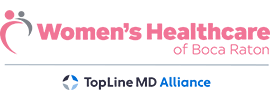Disclaimer: Please note that this blog is for educational purposes only, it includes general information on health-related topics. Women’s Healthcare of Boca Raton is giving medical advice to Patients Only. Follow this link to request an appointment with Dr. Ellman.
For many people, learning you’re pregnant can be one of the greatest joys in life. Visions of a life with a new child take over the imagination as you set to work telling your loved ones the good news and preparing for the baby’s arrival, just nine months away. Every future parent hopes for a smooth, easy pregnancy and healthy delivery, especially those for whom conceiving was a long and difficult process.
That’s why it can feel life-shattering when you learn that you’re carrying a high-risk pregnancy . Multiple conditions can lead to high-risk pregnancy so it’s important to get all of the information you can. That way you can be sure you’re doing everything possible to make your pregnancy safer and healthier. Many high-risk pregnancies are successful and the baby grows up to be a healthy child. Make sure to work with a specialist to keep you and your baby healthy during the pregnancy and after.
Definition of a High-Risk Pregnancy
Pregnancy and childbirth carry risks — always. There are nine months of gestation (the process of the baby growing inside the womb), which many chances for something to go wrong. Then there is the difficult process of giving birth and separating mother from child, which can be physically traumatic. This is why pregnancy and birth are monitored closely by medical professionals.
You may be asking, “So if all pregnancy carries risk, then what’s a high-risk pregnancy?” Carrying high pregnancy risk means there is a higher than average risk of illness or injury for either parent or child. Causes of a high-risk pregnancy can be present from the outset or develop later during the pregnancy, and they can range from minor to life-threatening. High-risk pregnancies increase the odds of health problems for either or both the baby and the parent during the pregnancy, at birth, and even after, and should be monitored closely by a specialist.
What Causes a High-Risk Pregnancy
There is a wide range of factors that can cause a high-risk pregnancy, and they are all associated with different levels of risk. Be sure to talk to your doctor about your conditions so you can stay well-informed and find a specialist if necessary.

Pre-existing Conditions
Age While age is not a medical condition, it is something out of your control that can affect your pregnancy, especially if you do not seek medical advice.
Most doctors agree that a pregnancy after the age of 35 is inherently higher risk, especially if it is the first pregnancy. Pregnancies over 35 have an increased chance of having issues during labor, like heavy bleeding, needing a C-section, or being in labor for longer than 20 hours. There may also be a higher risk of having a child with a genetic disorder.
Teenage pregnancy also carries significant risk. Teen mothers have a higher chance of giving birth to preterm births (preemies), and of developing high blood pressure and anemia. There are also tremendous social forces at work against teen moms, which may discourage them from seeking the appropriate medical care. For mothers under 17 and over 35, it is important to work closely with your doctor to ensure a healthy pregnancy and delivery.
Chronic Conditions
If you’ve been managing a chronic health condition before your pregnancy, you may already have known that your pregnancy could include higher risk and had time to emotionally and physically prepare. For example, autoimmune conditions like Lupus can increase the chances of preterm birth or a small baby and raise your risk of preeclampsia. Ideally, anyone dealing with chronic conditions will speak to their doctor before trying to conceive to better prepare for a healthy pregnancy.
Drug and Alcohol Use
Mothers who smoke typically give birth to underweight or premature babies. Alcohol and drug use have been linked to numerous, major health conditions that will affect your child’s long-term health. There is also an increased risk of stillbirth. Stop all substances when you find out you’re pregnant and seek help from a support group or medical professional if quitting is difficult for you.
Other risk factors that make a pregnancy higher risk include:
- Blood disorders like sickle-cell disease
- HIV/AIDS, which can be passed down to your child
- Hypertension, or high blood pressure
- Type 1 and Type 2 Diabetes
- Chronic kidney disease
- Heart conditions
- Thyroid diseases — both hyper- and hypothyroidism
- Depression and anxiety
- A history of pregnancy-related disorders in prior pregnancies, or a history of miscarriages
Conditions that Develop During Pregnancy
Sometimes risk factors develop even when the parent is healthy. Unfortunately, many of these conditions can’t be anticipated.
Conditions that develop during pregnancy can put you and your baby at a higher risk for health problems during the pregnancy, birth, and after. Some of these include:
- Gestational diabetes develops during pregnancy and puts the mother at increased risk of developing type 2 diabetes after the birth
- Multiple births (e.g. twins, triplets) increases the risk of preterm or small births
- Preeclampsia, a hypertension syndrome that can be fatal to mother and child if left untreated
- Growth problems and birth defects

How to Have a Healthier Pregnancy
Whether you have a pre-existing condition or not, you should seek care early. If possible, schedule an appointment with an OB-GYN before conception; they can counsel you on the best courses of action and warn you if you have any risk factors you should be aware of. Upon becoming pregnant, schedule prenatal appointments early and often. Your doctor will be able to closely monitor your pregnancy and keep an eye out for any developing signs of high-risk pregnancy. Follow their advice closely. Quality high-risk pregnancy care is crucial to your health at this time. They can help you manage your conditions to make your pregnancy as safe as it can be, or they may refer you to a specialist.
A maternal-fetal medical practitioner (MFM) is a specialist who deals with high-risk pregnancies and completed an additional 2-3 years of medical school for this title. They are essentially a high-risk OB-GYN and they will guide you through your high-risk pregnancy. Some patients only see their MFM once, others see them regularly. It all depends on your unique pregnancy and risk factors.
Some other steps you can take to ensure a healthy pregnancy include:
- Eat healthy
- Exercise as recommended by your doctor
- Gain a healthy amount of weight
- Reduce your stress
- Take prenatal vitamins, particularly 400mcg of folic acid daily through the entire pregnancy
- Protect yourself from infections and stay up to date on immunizations
- Avoid any drugs not cleared by your doctor, including prescriptions, over-the-counter, and illicit substances
Find Support
Learning you have a high-risk pregnancy can come as quite a shock. Be sure to find support to get through any emotional distress this may cause you.
If you do not feel comfortable with your OB-GYN, interview other doctors to find one who makes you feel safe and heard. They are going to be an integral part of your pregnancy, so make sure it’s someone you want on your team. The same goes for your high-risk pregnancy doctor, whether that be your OB or an MFM.
Find someone to talk to. You may have a supportive partner, friend, or parent, which is a great foundation for a strong support system. But consider finding a support group or a therapist to help you through the emotional side of carrying a high-risk pregnancy and postpartum.
If you are struggling with alcohol or substance abuse, ask your doctor or a trusted individual for advice on support groups, rehabilitation, or therapy options.
And if you are dealing with a chronic pre-existing condition, make sure to work with your pregnancy doctor and your general practitioner or specialist who already helps you manage your condition to ensure you stay at your healthiest throughout your pregnancy.
A high-risk pregnancy is not the end of the world. With a team of support and medical professionals, you can manage your risk factors and birth a beautiful and healthy child.
If you or a loved one needs advice about high risk pregnancy care, Dr. Ellman will be happy to speak with you! Dr. Ellman is a high risk OB/GYN doctor who established his medical practice in South Florida over 25 years ago. Go to our website today to learn about the services he provides.

Dr. Ellman is a Board Certified OBGYN who established his medical practice in South Florida over 25 years ago. His office, Women’s Healthcare of Boca Raton, is located in Boca Raton, Florida at West Boca Medical Center. Dr. Ellman attended Albert Einstein College of Medicine of Yeshiva University, where he received his medical degree. He went on to intern at Beth Israel Hospital in Boston- an affiliate of Harvard Medical School- and continued his residency at North Shore University Hospital in Manhasset, New York- an affiliate of Cornell Medical School.
Dr. Ellman has practiced Obstetrics and Gynecology in the Boca Raton area since 1995. In addition to treating patients at West Boca Hospital, Dr. Ellman also treats patients through his own private practice, Women’s Healthcare of Boca Raton, located on the West Boca Medical Campus.

